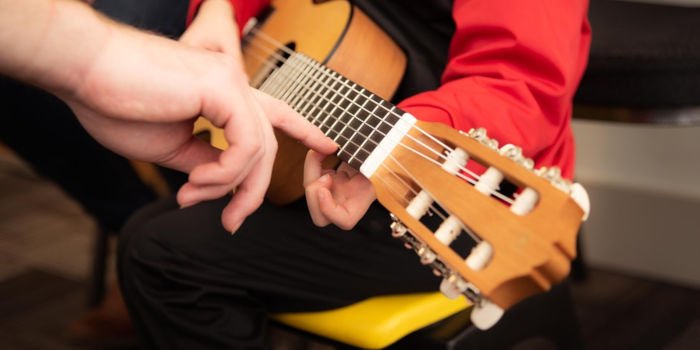The Many Benefits of Teaching Guitar

Published: 31/01/2014
Under: Music Business
Ashley, are you serious? Do you think I should teach guitar? No – Never.
Ok. I get it; you don’t where to start or how to explain concepts. That’s not to mention patience!
You might not be able to read music, let alone write it. And finding students – sounds confusing?!
You probably have another 100 questions run around your head.
Let’s explore the benefits of teaching guitar and talk about what to teach. I’ll also give you some tips on how to teach and help you to get over your mental block.
Why teaching
If we leave the money to one side (although teaching is very lucrative), there are many benefits of teaching guitar including self-growth.
One of the hardest things for anyone is to play in front of one person. It’s completely different from playing a gig in front of 100 or so people. It’s far harder as that person’s full concentration is on you – it’s scary!
However, as I’m playing in front of one person in every lesson, my confidence has grown. The lasting result is that I’ve played better at gigs because of it.
Another challenge I face when playing with students is maintaining timing and feel. It’s a real skill to play with another person while having a great feel and time. Teaching forces you to up your rhythm guitar playing, especially if the student is learning how to solo.
Developing these useful skills is just one of the many benefits of teaching guitar.
Major challenges
One of the major challenges I face in every lesson is being able to explain complex musical concepts, in the simplest way possible. It could take me a few attempts to explain the ideas fully.
Sometimes, I might have to re-think how I explain on the spot and keep trying different explanations until the student gets it.
Not only is this a challenge for me but it helps to solidify my own knowledge and tests my understanding of the material.
With all that said, my biggest test is pace. I have to be continually sensing the speed at which the student is understanding and processing the material.
Is she tired after a long day and thus I need to take my time to explain or to show her what I’m playing?
Maybe I need to slow down and only try to cover some of my plans. It could be my student has had a great day. So, we can go faster than usual while ramping up how challenging the material is?
Do we need to slow down this lesson and get a four-bar phrase 100% nailed and iron out all the mistakes?
What to teach
Start with what you know. If you know a few basic open guitar chords and the Minor Pentatonic scale, then start there. Use a friend as a guinea pig. You’ll see the benefits of teaching guitar right away. Your self-confidence will grow and your guitar playing will be better.
Over time you will need to learn some more complex chords as well as the CAGED system. You’ll also want to learn some scales (however, you only need ever need four scales – Major, Harmonic Minor, Minor Pentatonic and Chromatic).
Over time you will want to develop your ear so that you can figure out songs. While I often write out solos, licks and other single note lines, I started by working out chord patterns for students. You’ll have to learn to read and write music in the long term, however, a good local piano teacher can help you along the way to achieve this goal.
Being able to write out songs will do wonders for your playing. As well as your bank balance as you’ll never need to buy another songbook! You will also enable you to write up songs that your students want to learn.
Even if you just improve your ear, that alone is the greatest benefit of teaching guitar and a skill, you’ll use forever.
Teaching tips
I’m going to be brief here and give you some general pointers, in no particular order.
First – Focus
When you’re teaching, your only focus should be on the student. I’ve heard horror stories of teachers checking their email in the lesson or taking a personal call in the middle of the lesson. Not only is this rude, but it’s also disrespectful to the student.
If you want a student to return, focus all you’ve got on the time you have with them.
Second – Prepare well
The real secret to being good at anything in life is being prepared! It really is that simple. Even if you just have 5 minutes, use that time to think about what you covered in the last lesson and what you will cover in this lesson.
Third – Create worksheets
If you’re going to cover a song/basic chords/scale with a few students, make it into a worksheet. You’ll look more professional. Also, you can save lesson time but not having to write things out.
Fourth – Be ready
Be set up and ready for the student if they are coming to you. This means being ready to go at least 10 minutes before the lesson starts. Use this 10 minutes to warm up, tune your guitar and to clear your head.
If you’re going to them, make sure you arrive a few minutes early, so you can start dead on time. If you’re 5 minutes late starting one lesson, it’s likely that you’ll be late for the rest and end up working an extra 30 minutes (for free – no less), all because of one small hiccup.
Fifth – Break in between students
If you’re teaching from home or a fixed location, it’s a good idea to schedule students 10-15 minutes apart. This way if you overrun, by a few minutes, you’ll be ok and won’t feel rushed. If you run to time, it means you have time to grab a drink and use the toilet.
Six – Offer water
Teaching from home? Then always offer the student a glass of water. Why? It is medically proven that we concentrate better when hydrated and water is the best liquid to use to quickly hydrate your body and mind.
Mental Brick Wall
Henry Ford is wide quoted as saying – ‘Whether you think you can, or you think you can’t – you‘re right.’
He’s right! If you don’t believe me, every time you say “I can’t do blank”, give it a go. I bet you will find out that if you try hard, then you can. The mind is great at creating brick walls which hold us back from our full potential.
Luckily, these mental walls are not as solid as we believe. We can smash through them and overcome our fears!
The best way to start teaching guitar is to actually start! Find a friend or two to start with and build from there. This could be your route out of the 9 to 5 job. Wouldn’t you like to earn a living doing what you love?
Conclusion
Hopefully you’ve learn about some of the benefits of teaching guitar offers.
For a more complete guide to starting your own teaching business, I’ve written an ebook Earn A Living Teaching Guitar and it’s worth a read.






Leave a Reply